 W
WThe Blochausen Ministry was the government of the Grand Duchy of Luxembourg from 26 December 1874 to 20 February 1885. It was led by Baron Félix de Blochausen.
 W
WCapellen is a canton in southwestern Luxembourg. Its capital is Capellen.
 W
WClervaux is a canton in the north of Luxembourg. Its capital is Clervaux.
 W
WDiekirch is a canton in the north of Luxembourg. Its capital is Diekirch. Neither the canton, town, nor commune of Diekirch should be confused with the former district of Diekirch, one of three administrative units in Luxembourg abolished in October 2015.
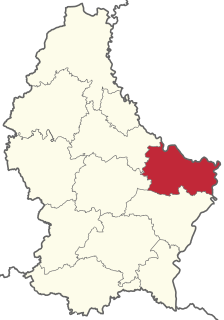 W
WEchternach is a canton in the east of Luxembourg. Its capital is Echternach.
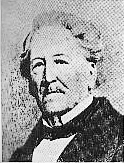 W
WThe Fontaine Ministry formed the government of Luxembourg from 1 August 1848 to 2 December 1848.
 W
WLuxembourg, also known as Luxembourg City, is the capital city of the Grand Duchy of Luxembourg and the country's most populous commune. Standing at the confluence of the Alzette and Pétrusse rivers in southern Luxembourg, the city lies at the heart of Western Europe, situated 213 km (132 mi) by road from Brussels, 372 km (231 mi) from Paris, and 209 km (130 mi) from Cologne. The city contains Luxembourg Castle, established by the Franks in the Early Middle Ages, around which a settlement developed.
 W
WThe Luxembourg Coup of 1856, also called the Putsch of 1856, was a reactionary revision of Luxembourg's constitution on 27 November 1856. Whilst not a true coup d'état or revolution, its detractors dubbed it a 'royal coup', as the reigning Grand Duke of Luxembourg, William III, greatly expanded his powers, and the name has stuck. Aimed at reversing the liberal successes embodied in the 1848 constitution, the major changes enacted by William were undone with the promulgation of a new constitution in 1868, after the Luxembourg Crisis. However, some changes, such as the creation of the Council of State have lasted.
 W
WThe Luxembourg Crisis was a diplomatic dispute and confrontation in 1867 between the French Empire and Prussia over the political status of Luxembourg. The confrontation almost led to war between the two parties, but was peacefully resolved by the Treaty of London.
 W
WMersch is a canton in the centre of Luxembourg. It is the only canton, other than Luxembourg, to be entirely surrounded by other cantons, and therefore not to have an international boundary. Its capital is Mersch.
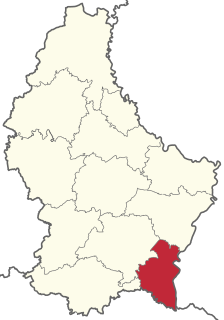 W
WRemich is a canton in the east of Luxembourg. Its capital is Remich.
 W
WThe Servais Ministry was in office in Luxembourg from 3 December 1867 to 26 December 1874. It was reshuffled four times.
The Simons Ministry was in office in Luxembourg from 23 September 1853 to 26 September 1860. Initially it just consisted of three members of the government, to which two more were added on 23 September 1854.
 W
WThe Thilges Ministry formed the government of Luxembourg from 20 February 1885 to 22 September 1888.
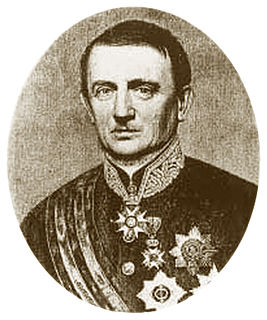 W
WThe Tornaco Ministry was in office in Luxembourg from 26 September 1860 until 3 December 1867. It was reshuffled six times.
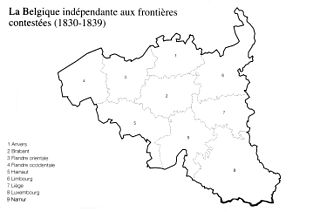 W
WThe Treaty of London of 1839, also called the First Treaty of London, the Convention of 1839, the Treaty of Separation, the Quintuple Treaty of 1839, or the Treaty of the XXIV articles, was a treaty signed on 19 April 1839 between the Concert of Europe, the United Kingdom of the Netherlands and the Kingdom of Belgium. It was a direct follow-up to the 1831 Treaty of the XVIII Articles which the Netherlands had refused to sign, and the result of negotiations at the London Conference of 1838–1839.
 W
WThe Treaty of London, often called the Second Treaty of London after the 1839 Treaty, granted Luxembourg full independence and neutrality. It was signed on 11 May 1867 in the aftermath of the Austro-Prussian War and the Luxembourg Crisis. It had wide-reaching consequences for Luxembourg and for relations among Europe's Great Powers.
 W
WVianden is a canton in the north of Luxembourg. Its capital is Vianden.
 W
WThe Willmar Ministry was in office in Luxembourg from 2 December 1848 to 23 September 1853.
 W
WWiltz is a canton in northwestern Luxembourg. Its capital is the city of Wiltz. It covers an area of 264.55 km², and as of 2018 it has a population of 16,735.